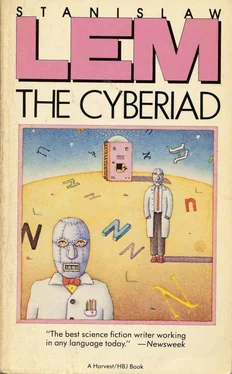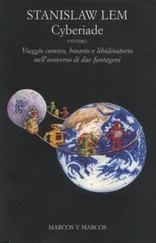The machine quickly grew so adept at this, that it could cut down a first-class rhapsodist with no more than one or two quatrains. But the worst of it was, all the third-rate poets emerged unscathed; being third-rate, they didn’t know good poetry from bad and consequently had no inkling of their crushing defeat. One of them, true, broke his leg when, on the way out, he tripped over an epic poem the machine had just completed, a prodigious work beginning with the words:
Arms, and machines I sing, that, forc’d by fate,
And haughty Homo’s unrelenting hate,
Expell’d and exil’d, left the Terran shore…
The true poets, on the other hand, were decimated by Trurl’s electronic bard, though it never laid a finger on them. First an aged elegiast, then two modernists committed suicide, leaping off a cliff that unfortunately happened to lie hard by the road leading from Trurl’s place to the nearest train station.
There were many poet protests staged, demonstrations, demands that the machine be served an injunction to cease and desist. But no one else appeared to care. In fact, magazine editors generally approved: Trurl’s electronic bard, writing under several thousand different pseudonyms at once, had a poem for every occasion, to fit whatever length might be required, and of such high quality that the magazine would be torn from hand to hand by eager readers. On the street one could see enraptured faces, bemused smiles, sometimes even hear a quiet sob. Everyone knew the poems of Trurl’s electronic bard, the air rang with its delightful rhymes. Not infrequently, those citizens of a greater sensitivity, struck by a particularly marvelous metaphor or assonance, would actually fall into a faint. But this colossus of inspiration was prepared even for that eventuality; it would immediately supply the necessary number of restorative rondelets.
Trurl himself had no little trouble in connection with his invention. The classicists, generally elderly, were fairly harmless; they confined themselves to throwing stones through his windows and smearing the sides of his house with an unmentionable substance. But it was much worse with the younger poets. One, for example, as powerful in body as his verse was in imagery, beat Trurl to a pulp. And while the constructor lay in the hospital, events marched on. Not a day passed without a suicide or a funeral; picket lines formed around the hospital; one could hear gunfire in the distance —instead of manuscripts in their suitcases, more and more poets were bringing rifles to defeat Trurl’s electronic bard. But the bullets merely bounced off its calm exterior. After his return from the hospital, Trurl, weak and desperate, finally decided one night to dismantle the homeostatic Homer he had created.
But when he approached the machine, limping slightly, it noticed the pliers in his hand and the grim glitter in his eye, and delivered such an eloquent, impassioned plea for mercy, that the constructor burst into tears, threw down his tools and hurried back to his room, wading through new works of genius, an ocean of paper that filled the hall chest-high from end to end and rustled incessantly.
The following month Trurl received a bill for the electricity consumed by the machine and almost fell off his chair. If only he could have consulted his old friend Klapaucius! But Klapaucius was nowhere to be found. So Trurl had to come up with something by himself. One dark night he unplugged the machine, took it apart, loaded it onto a ship, flew to a certain small asteroid, and there assembled it again, giving it an atomic pile for its source of creative energy.
Then he sneaked home. But that wasn’t the end of it. The electronic bard, deprived now of the possibility of having its masterpieces published, began to broadcast them on all wave lengths, which soon sent the passengers and crews of passing rockets into states of stanzaic stupefaction, and those more delicate souls were seized with severe attacks of esthetic ecstasy besides. Having determined the cause of this disturbance, the Cosmic Fleet Command issued Trurl an official request for the immediate termination of his device, which was seriously impairing the health and well-being of all travelers.
At that point Trurl went into hiding, so they dropped a team of technicians on the asteroid to gag the machine’s output unit. It overwhelmed them with a few ballads, however, and the mission had to be abandoned. Deaf technicians were sent next, but the machine employed pantomime. After that, there began to be talk of an eventual punitive expedition, of bombing the electropoet into submission. But just then some ruler from a neighboring star system came, bought the machine and hauled it off, asteroid and all, to his kingdom.
Now Trurl could appear in public again and breathe easy. True, lately there had been supernovae exploding on the southern horizon, the like of which no one had ever seen before, and there were rumors that this had something to do with poetry. According to one report, that same ruler, moved by some strange whim, had ordered his astroengineers to connect the electronic bard to a constellation of white supergiants, thereby transforming each line of verse into a stupendous solar prominence; thus the Greatest Poet in the Universe was able to transmit its thermonuclear creations to all the illimitable reaches of space at once. But even if there were any truth to this, it was all too far away to bother Trurl, who vowed by everything that was ever held sacred never, never again to make a cybernetic model of the Muse.
The Second Sally
or
The Offer of King Krool

The tremendous success of their application of the Gargantius Effect gave both constructors such an appetite for adventure, that they resolved to sally forth once again to parts unknown. Unfortunately, they were quite unable to decide on a destination. Trurl, given to tropical climes, had his heart set on Scaldonia, the land of the Flaming Flamingos, while Klapaucius, of a somewhat cooler disposition, was equally determined to visit the Intergalactic Cold Pole, a bleak continent adrift among frozen stars. The friends were about to part company for good when Trurl suddenly had an idea. “Wait,” he said, “we can advertise our services, then take the best offer!”
“Ridiculous!” snorted Klapaucius. “How are you going to advertise? In a newspaper? Do you have any idea how long it takes a newspaper to reach the nearest planet? You’ll be dead and buried before the first offer comes in!”
But Trurl gave a knowing smile and revealed his plan, which Klapaucius—begrudgingly—had to admit was ingenious, and so they set to work. All the necessary equipment quickly thrown together, they gathered up the local stars and arranged them in a great sign, a sign that would be visible at truly incalculable distances. Only blue giants were used for the first word—to get the cosmic reader’s attention—and lesser stellar material made up the others. The advertisement read: TWO Distinguished Constructors Seek Employment Commensurate with Their Skill and Above All Lucrative, Hence Preferably at the Court of a Well-heeled King (Should Have His Own Kingdom), Terms to Be Arranged. It was not long before, one bright morning, a most marvelous craft alighted on their front lawn. It gleamed in the sun, all inlaid with mother-of-pearl, had three legs intricately carved and six additional supports of solid gold (quite useless, since they didn’t even reach the ground—but then, the builders obviously had more wealth than they knew what to do with). Down a magnificent staircase with billowing fountains on either side there came a figure of stately bearing with a retinue of six-legged machines: some of these massaged him, some supported him and fanned him, and the smallest flew above his august brow and sprayed it with eau de cologne from an atomizer. This impressive emissary greeted the constructors on behalf of his lord and sovereign, King Krool, who wished to engage them.
Читать дальше













